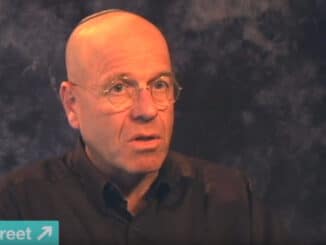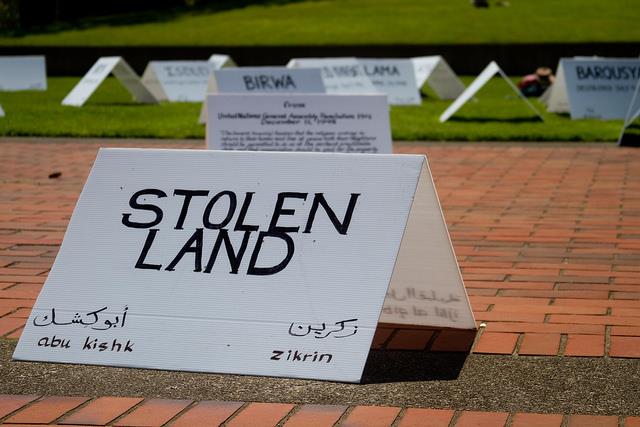In Israel protestieren seit Wochen Hunderttausende auf den Straßen von Tel Aviv und andernorts, um gegen die sozialen Mißstände im Land zu protestieren.
So eine massive Protestbewegung hat das Land seit seinem Bestehen noch nicht gesehen.
Der israelische journalist und Blogger Dimi Reider (972mag) gab der amerikanischen Plattform DemocracyNow! und deren Chefin Amy Goodman kürzlich zusammen mit dem Journalisten Zeev Shalev folgendes sehr aufschlußreiche Interview (Auszüge):
AMY GOODMAN:
Wir wenden uns nun nach Israel, wo sich Zehntausende von Menschen den landesweiten Protesten gegen hohe Lebenshaltungskosten und wachsende Einkommensungleichheit angeschlossen haben und mehr als 40 Zeltlager in ganz Israel aufgebaut haben.
Gestern [wurde] eine Vereinbarung veröffentlicht, in der die Meschen ihre Forderungen an die Regierung darlegen: Darunter Steuersenkungen, ein besserer Zugang zu Bildung und Wohnen.
Die Polizei schätzt, dass sich landesweit bis zu 120.000 Menschen als Unterstützer einer Bewegung erwiesen haben, die in den letzten Wochen an Dynamik gewonnen hat. In Jerusalem versammelten sich rund 15.000 Menschen vor dem Haus des Premierministers Benjamin Netanjahu. Tausende marschierten auch in der Hauptstadt Tel Aviv.
ZEEV SHALEV: Ich bin hier im Zeltlager weil ich nicht sehe, dass ich weiterhin in einem Land leben möchte, das seine Bürger ausbeutet, keine Lösungen für Wohnen, Bildung, Transport und die Rahmenbedingungen für seine Bürger bietet. Und ich gehe nicht von hier weg, bis sich diese Situation geändert hat.
AMY GOODMAN: Um mehr darüber zu erfahren was in Israel passiert, treffen wir auf Dimi Reider, ein israelischer Journalist und Mitherausgeber des 972 Magazine in Tel Aviv.
That’s 972mag.com. He’s been covering the protests. His work appears in Foreign Policy, The Guardian, Ha’aretz, theJerusalem Post and other publications.
Willkommen bei Democracy Now!
Dimi, beschreiben Sie, was gerade passiert und welche Bedeutung diese Proteste haben und wie sie sich auf die anhaltenden Krisen in den besetzten Gebieten beziehen.
DIMI REIDER
Zuallererst ist es großartig, in dieser Sendung zu sein. Ich bin seit vielen Jahren ein großer Fan.
Was in Israel geschieht ist nichts anderes als revolutionär, nicht im Sinne eines Sturzes des Regimes, sondern in Bezug darauf, wie die Menschen miteinander umgehen, sich mit der Politik beschäftigen, sich mit den Themen auf der Tagesordnung befassen.
Wie Sie bereits erwähnt haben, sehen wir, dass sich Protestlager im ganzen Land ausbreiten. Wir sehen Linke, Rechte, Palästinensische Israelis, Jüdische Israelis, Ultra-Orthodoxe, LGBT-Aktivisten, die alle zusammenkommen, um gegen bestimmte Themen zu protestieren, mit denen sie alle ein gemeinsames Problem haben.
Die Frage der Besatzung [der palästinensischen Gebiete durch die israelische Armee] blieb jedoch bei den Protesten weitgehend unberücksichtigt, auch als strategisches Anliegen der Organisatoren.
AMY GOODMAN: Warum wurde dieses Thema ausgeklammert?
DIMI REIDER
Es scheint, dass die Idee hinter der strategischen Entscheidung war, dass es wahrscheinlich das einzige spaltende Thema der israelischen Gesellschaft ist, und wenn sie anfangen würden, gegen die Okkupation zu protestieren, hätten sie nicht einen Bruchteil dieser Unterstützung erhalten.
Sie wissen schon, die israelische Linke protestiert seit Jahrzehnten gegen die Besatzung, und die Zahl unserer Unterstützer sinkt weiter. Ich denke, sie wollten einen möglichst breiten wie gemeinsamen Nenner erreichen. Und dafür müssen sie, zumindest vorübergehend, die Besatzung beiseite schieben.
AMY GOODMAN: Can you talk about the significance of these encampments that have been set up?
DIMI REIDER: Well, it’s—you know, as someone who’s been active myself politically for nearly a decade and then covering the political scene as a journalist for quite a few years, it doesn’t resemble anything we’ve seen before. I mean, first of all, it breaks down—it completely excludes all the usual suspects from the game. It excludes the politicians. Most of the politicians have not been welcome guests in the encampments, and politicians from the Likud—politicians from the Likud were largely chased out of the camps, except for one or two who are perceived as being socially responsible and working for this social justice issue. And organized movements, like the [inaudible] organization, were either politely left out or kind of incorporated into the movement without giving them too much clout. So, it’s a decentralized political movement that insists on calling itself apolitical, insists on—insists that it’s nonpartisan. Decisions are made by consensus through popular assemblies. It very much resembles not only things that have been happening in the Arab world, but also the popular assemblies and the popular movement in Spain.
AMY GOODMAN: And what about that? How does what’s happening in Israel relate to these protests of the indignados in Spain, the thousands of people that have turned out throughout Spain, what’s happened in Greece, what’s happened in Egypt?
DIMI REIDER: I think it’s very—well, first of all, Egypt is a huge, huge inspiration for young Israelis here. I mean, we have signs on the main camp in Rothschild calling it Tahrir Corner. We have chants of “Mubarak, Assad, Netanjahu” in the protests. And, you know, generally, while the establishment here is very cautious and very—you know, had a very negative approach to the Egyptian revolution, in fact, as we just learned today, even offering Mubarak political asylum, the younger generation, especially young professionals, were very much inspired by what was happening there.
AMY GOODMAN: Dimi, explain what you just said about offering Mubarak political asylum.
DIMI REIDER: Oh, there was—former minister Benjamin Ben-Eliezer said today that Israel had offered Mubarak political asylum during the revolution, but Mubarak declined because he was a patriot.
AMY GOODMAN: Where does Benjamin Netanjahu, the prime minister of Israel, stand in the opinion polls right now? And there’s a major protest right outside his house.
DIMI REIDER: He doesn’t stand. He’s in freefall. You know, when he came back from his speech to Congress a couple of months ago, he had a general approval rating of I think like something like 52 percent. Over the past two weeks, it dropped to 35. In surveys, 87 percent of Israelis said they support the tent protests, and they think it’s a legitimate and genuine popular movement, while only 13 percent said that they support the Prime Minister. And even within his own party, just yesterday there was a survey that said 85, I think, percent of Likud voters support the protests, and 78 percent of his senior—of the voters for his senior coalition partner, Shas, support the protests. So he’s not doing very well at all.
AMY GOODMAN: And what has his response been to these protests? I mean, he has made news in the last few days saying he’ll negotiate on the ’67 borders with Palestinians if they drop their statehood bid at the United Nations next month.
DIMI REIDER: Yeah, well, I mean—
AMY GOODMAN: Where does he stand on both issues, on the protests around income inequality, around the—what’s happening in Israel, and on the issue of a Palestinian state?
DIMI REIDER: Well, I think that on the first issue, his response, first—he first tried to appropriate the protests, to say that, you know, “Nobody understands the issue like I do. I’ve seen the problem years ago, and I’m going to fix it in a few months.” And he tried selling the so-called National Housing Committees law, that just passed this morning in the Knesset, as the solution to Israel’s housing problem. Now, Netanjahu is ideologically hard-wired Thatcherite. He cannot conceive of a solution other than more privatization. So his solution, you know, while people are marching in the streets and sitting in front of police force men, chanting for a welfare state, he was saying that the problem is that there is not enough state land has been privatized, and we need to privatize more and bring in more entrepreneurs into the market, to increase supply, and therefore lower the prices. Now, this didn’t go down well with the protesters.
He next—not himself directly, but some of his ministers and some if his party members, have tried to delegitimize the protests, saying that they’re organized by, you know, Israel-hating anarchists, draft dodgers, etc., etc. That didn’t work, either. He tried to buy out the powerful National Union of Students from the movement by offering student-only subsidies. They thanked him politely and said they’re morally obligated to stay within the struggle. So, so far, his attempt to confront or to somehow engage with the protests have failed.
In terms of the Israeli-Palestinian issue, he hasn’t made headlines in the foreign media regarding his agreement to talk about ’67 borders. It hardly made any news here. So if he was hoping to distract from the protests, that didn’t really work. People here—journalists here speculate that he still has some avenues left to try and distract from the protests. I mean, one, the more positive development that he would suddenly achieve a breakthrough in the negotiations to swap 1,000 Palestinian prisoners for captive soldier Gilad Shalit and try to get some popularity there. It’s probably—if he is considering that, it’s probably not going to work, because then the protesters will see that not only are they capable of getting him very, very anxious, they are also capable of completing that deal, that most Israelis support, despite his—you know, despite his objections and reluctance, and it will probably only give them more energy.
Another much less pleasant option is that he will try to either provoke an escalation on one of Israel’s many fronts or to overreact to any provocation from the other side. So we are watching very anxiously to see if there are any incursions planned or if the air force is bombing in Gaza or—as you know, there was an exchange of fire with Lebanese troops the other day. Most people in the tent protests are kind of—they’re pretty much aware of that possibility, so there’s a lot of cynicism regarding the possibility of escalation. There’s even now a pretty big group on Facebook, where the protests are being organized, a group saying that we will continue protesting even if there is an armed conflict.
But, you know, September is looming. It’s already being used to fearmonger. And we had the chairman of the Knesset Committee on Defense and Foreign Affairs, Shaul Mofaz, say yesterday that the IDF will probably need to recruit its reserves in September. And, you know, many of the protesters camped out are reserve soldiers, who would be faced with either refusing the draft or joining the—rejoining the army [inaudible]—
AMY GOODMAN: Dimi Reider, we have to leave it there, because we’re going end the show in Egypt, where Mubarak is going on trial. I want to thank you very much for being with us, Israeli journalist, co-editor of972mag.com. His work appears in The Guardian, Ha’aretz, Jerusalem Post, other publications.
—
Beitrag von DemocracyNow! (CC Lizenz)



